Permanent Daylight Saving Time?
We may be on the verge half a century after our last experiment.
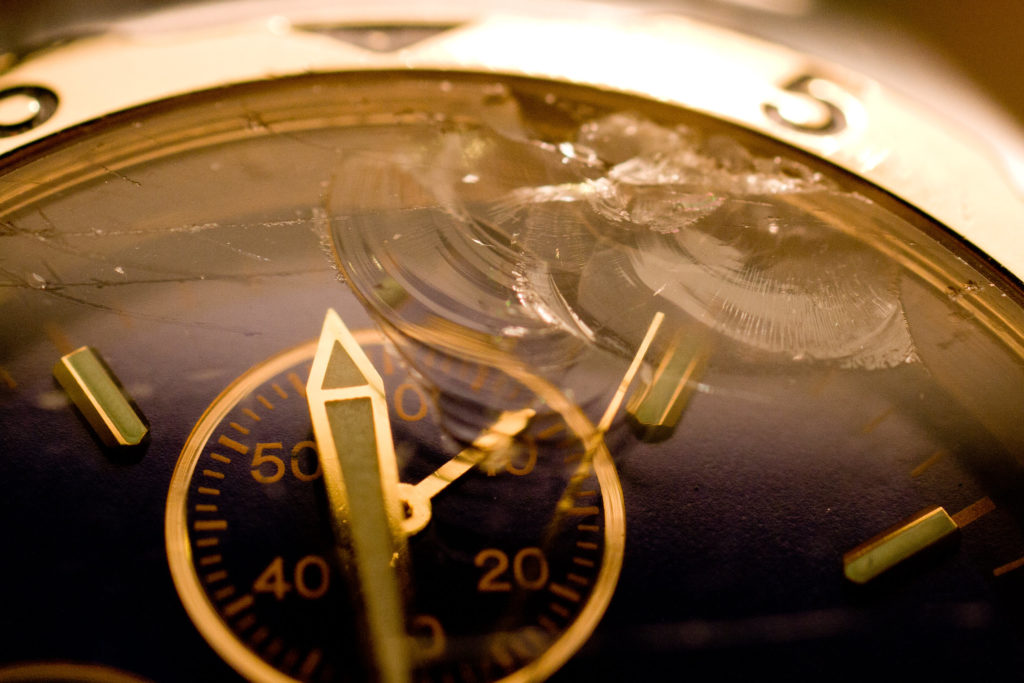
As we sprung forward this weekend, I made light of the biennial tradition of media commentary on the merits of Daylight Saving Time. Well, they might come to an end.
NPR (“The Senate approves a bill to make daylight saving time permanent“):
The Senate passed a bill Tuesday that would make daylight saving time permanent across the U.S. beginning in 2023. The so-called Sunshine Protection Act of 2021 was approved by unanimous consent, but would still require House approval and President Biden’s signature to become law.
For those wishing for an end to annual clock shifting, this most recent push in Congress is perhaps better late than never.
“We don’t have to keep doing this stupidity anymore. And why we would enshrine this in our laws and keep it for so long is beyond me,” Sen. Marco Rubio, R-Fla., one of the sponsors of the bill, said on the Senate floor.
“Hopefully, this is the year that this gets done. And pardon the pun, but this is an idea whose time has come,” he added.
House Majority Leader Steny Hoyer’s office tells NPR that there are no immediate plans to vote on daylight saving time, but they note the House Committee on Energy and Commerce had a hearing on it last week and there’s bipartisan support for it.
Daylight saving time began as a bid to pack more hours of sunlight into the day during the summer months and cut down on energy use, though critics question how effective it’s been toward that goal.
Instead, health experts say switching our clocks twice a year has led to an uptick in sleep deprivation and other health problems. The American Academy of Sleep Medicine supports a year-round national clock.
Daylight saving time currently makes up roughly eight months of the year, with the remainder counterintuitively called standard time.
This phenomenon is not unique. As I often remind students, “irregular” warfare is much more common than conventional state-on-state conflict like World War II.
As to the sleep experts, they do indeed want to stop switching clocks. Alas, they want to go in the opposite direction.
WaPo (“Stop springing forward, say sleep experts pushing standard over daylight saving time“):
According to the American Academy of Sleep Medicine, the switch to DST does more than temporarily throw our sleep schedule out of whack: Data shows it poses serious public health and safety risks. And now, members of the prominent sleep organization have made it clear that if they had it their way, the country would finally be rid of the decades-old system of shifting between standard time and DST, which is observed by all but two states and some U.S. territories.
A growing body of evidence prompted the academy to release its first position statement on the subject, recommending that the country eliminate the biannual switches in favor of year-round standard time, which it asserts better aligns with the human body’s natural circadian rhythms. The statement was published this week in the academy’s Journal of Clinical Sleep Medicine and received support from more than a dozen other organizations, including the National Safety Council and the National Parent Teacher Association.
While acknowledging it is only one of many voices in the issue, the academy hopes its statement will help reinvigorate debate on the matter.
“There’s been accumulating evidence over the last several years indicating that daylight saving time in general, but even more importantly, the switches between daylight saving time and standard time, are deleterious to health in various realms: cardiovascular health, motor vehicle accidents and crashes, psychological health,” said M. Adeel Rishi, vice chair of the AASM’s public safety committee. Rishi added that the AASM’s position is consistent with the views of other major sleep organizations.
There’s widespread agreement that picking a “permanent” time, regardless of which direction we go, is best because it takes people so long to adjust to the switch. But, again, most argue for “standard” time.
“Standard time is going to be your best situation where your social clock, your internal biological clock and your sun clock are going to be more likely, for the most time, to be better aligned,” said Phyllis Zee, chief of sleep medicine at Northwestern University’s Feinberg School of Medicine. She added: “It may not be true for every single person. It really depends on where you live, whether you’re an owl or a lark. All of these things matter. But I think overall, as a general policy, that would be the healthiest solution.”
Almost everything in the human body, down to the rate at which cells divide, follows a circadian rhythm, Gehrman said. A good circadian rhythm is critical to keeping people’s bodies synchronized internally, as well as with the environment.
“Having good, strong, regular rhythm, and as part of that, rhythms that are in sync with the schedule we’re keeping, . . . it’s just a pillar of good health,” he said.
If the country institutes permanent DST, Rishi said, that may put people at risk of a condition known as “social jet lag.”
“Social jet lag is basically the chronic misalignment between the timing of the demand of work, school or other obligations against innate circadian rhythm,” he said, using an example of a night owl who spends most of their life staying up late and waking up early to meet responsibilities.
“There is evidence that social jet lag is associated with obesity, with metabolic syndrome, with cardiovascular disease, with psychological problems like depression,” he added.
Meanwhile, Washingtonian senior editor Andrew Beaujon reminds us “The US Tried Permanent Daylight Saving Time in the ’70s. People Hated It.“
Congress had voted on December 14, 1973, to put the US on daylight saving time for two years. President Nixon signed the bill the next day. The US had gone to permanent daylight saving time before, during World War II. Then, too, the measure was enacted to save fuel.
[…]
And yet the early-morning darkness quickly proved dangerous for children: A 6-year-old Alexandria girl was struck by a car on her way to Polk Elementary School on January 7; the accident broke her leg. Two Prince George’s County students were hurt in February. In the weeks after the change, eight Florida kids were killed in traffic accidents. Florida’s governor, Reubin Askew, asked for Congress to repeal the measure. “It’s time to recognize that we may well have made a mistake,” US Senator Dick Clark of Iowa said during a speech in Congress on January 28, 1974. In the Washington area, some schools delayed their start times until the sun caught up with the clock.
The factual picture was a bit more complicated. The National Safety Council reported in February that pre-sunrise fatalities had risen to 20 from 18 the year before. In July, Roger Sant, then an assistant administrator-designate for the Federal Energy Administration, wrote a letter to the Post that noted a 1 percent energy saving achieved by going to DST equated to 20,000-30,000 tons of coal not being burned each day. Further, he wrote, accidents had fallen in the afternoons.
By August, though, as the Watergate scandal caused the Nixon administration to crumble, the country was ready to move on from its clock experiments. While 79 percent of Americans approved of the change in December 1973, approval had dropped to 42 percent three months later, the New York Times reported. Seven days after President Nixon resigned, US Senator Bob Dole of Kansas introduced an amendment in August that would end the DST experiment. It passed. A similar bill passed the House. In late September, the full Congress passed a bill that would restore standard time on October 27. President Ford signed it on October 5. Energy savings, a House panel noted, “must be balanced against a majority of the public’s distaste for the observance of Daylight Saving Time.”
I was a kid in 1973 and probably not paying much attention to time switches. I have no recollection of unusually dark mornings waiting for the school bus but memories tend to fade after 49 years.
Reports of kids getting injured because of the darkness will naturally be sensationalized but it seems that the aggregate data don’t bear it out. But the fact that the last experiment lasted only a year is perhaps telling.

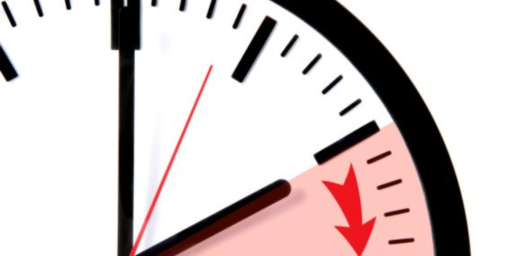

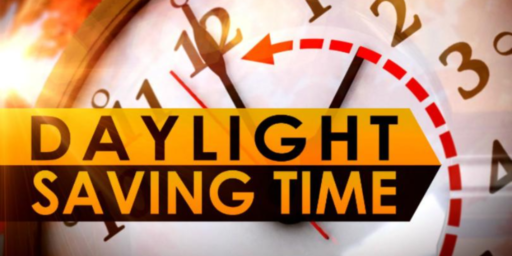
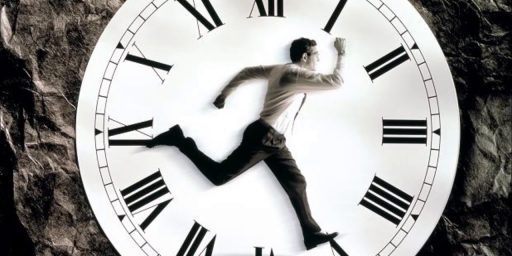
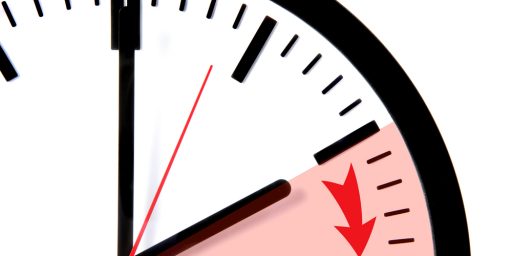
If the main objection for most people is the “kids waiting for the school bus in the dark” issue, just…*gasp*…start the school day an hour later in December/January.
One thing I don’t get in all this: why does everyone act as if we are slaves to the clock? If, in the dead of winter, it’s too dark for the kiddies going to school then start later for a couple of months. When my headquarters were in Boulder there was an official policy of a dual workday in the summer months: the normal 8:30 to 5:00 or 7:00 to 3:30 so people could get out and hike or bicycle or whatever they wanted to do. Start and stop times are set locally, not by the federally government.
I’m a fan of the time switch, as I’ve said before here. I’m far enough north that it actually makes a difference both ways–permanent DST would have it dark out here until almost 9:00 a.m. in winter, and permanent standard time would have the sun rising ridiculously early in summer (I think 4:30 a.m. or something like that).
That said, whatever. There are bigger things to worry about, and we’d have until next year to prepare (this wouldn’t take effect until 2023 because things like flight schedules and so on have already been baked into annual plans).
I posted a comment on the open thread on this very topic a minute ago.
I kinda vaguely remember the 74-75 experiment (I was eleven). It was very dark in the morning during winter under that regime. I lived close enough to walk to school. I recall it as creepy and weird.
Most of us are programmed and amenable to be diurnal as baseline. We wake at dawn, as a general rule. Nearabouts.
As an adult, I did not adjust well and my body really wanted to be a nightowl, but my work schedule said be here at 8 AM. I complied, but it was difficult.
I no longer have to be anywhere on a schedule so I now sleep and wake as it suits me that particular day. I “woke up” this morning at 2 AM. Three days from now I will probably “get up” at 11 or 3 – AM or PM, it really does not matter. I no longer need to be anywhere in particular at a certain time so I just go with what my body tells me to do.
Guys, wouldn’t setting different starting times for school and work in the summer and winter be exactly equivalent to the current system?
I do like the name of Sunshine Protection Act. Nobody is against sunshine! Sadly, the amount of sunshine we receive is not influenced by Congress.
Thank Dawg, my *hands* gave out and I’m not working anymore. They couldn’t possibly handle it.
** hands, wrists, elbows, shoulders, neck, back….
@Slugger: Yes and no. The current setup is mandated and universal. Starting school or work at different times would be voluntary, some would change the times, some wouldn’t, and it would end up an unworkable mess.
As Kingdaddy pointed out on Twitter, the problem is less the clock switch (which I think we should do away with) and more the way the US handles time zones–in particular the Eastern Time Zone, because everyone wants to be on the same time as NYC and DC.
I’m a bit confused at the, “…it’s dark for kids on the way to school” argument. Isn’t that the case with standard time as well? I mean I was in class at 8 AM meaning the bus came almost an hour earlier then that. There is no time scheme there kids aren’t going to school in the dark. Also, isn’t it true that starting later in generally is better for kids?
But honestly who rides the bus anymore, ever go though the gaggle of parents dropping kids off at school in the morning? That is taking your life in your own hands.
Can’t Congress just pass a law mandating the world be as we want it to be and not as it is?
@Slugger:
Or maybe a better question: why not just start school later? Last time I checked, Seattle was starting middle and high school at 8:30 or 9, I think. How’s that working for them?
@mattbernius: No. No, I don’t.
It’s irritating, yeah. But I do not want to be on the same TZ as NYC. Nobody from PST (or PDT) timezone thinks that. It would be weird.
I remember the permanent DST of the 70’s. I was a junior in high school. It was weird to start school in the morning, but it was supposedly saving energy. I have no idea if that worked. It was weird. So why are we doing this now? Dropping DST would make more sense.
@Rick DeMent: “But honestly who rides the bus anymore,”
Our school district here has roughly 85 buses delivering kids to 3 elementary, 2 middle, and one high school. Mostly the kids who ride the bus are the ones whose parents work in the paper mills, at the Foster Farms plant, or do other work, usually at low wages–but not always, that starts before banks and offices open. So roughly 60% of the population in our relentlessly blue-collar town.
Shifting the workday to start and end an hour later would certainly have that effect in terms of whether it’s dark when you start your workday or when you end your workday, but not so for school. Most schools currently end their day at 2:30 or 3:00, so even if we shifted that to 3:30 or 4:00, it would still be light out.
Beyond that, though, I think there’s just a psychological component to it. I’m not a morning person at all, so for me, and I imagine a lot of other DST fans, watching the sunrise on my way to work in the morning for a couple of months in the winter is actually kind of nice – I get to see/enjoy something I would usually sleep through – whereas looking out my office window at 5:00 in the afternoon and seeing that it’s already “nighttime” is just depressing.
@Jen: Except we have an demostrably non-working mess *now*. Some states change, others don’t. And we change on a different date than the rest of the world, which has been f***ing up international video calls for 16 years now (because Congress thought we would save 0.013% in energy usage). “Oh, you guys switched last week? Sorry I missed the meeting.” – a conversation I’ve heard a thousand times and could frankly do without.
As said elsewhere, though, why not stick to standard time rather than DST? Here in Michigan, “high noon” (where is the sun is highest” is already at roughly 1pm on standard time. Now we’re permanently making it 2pm?
On the other hand, all of China is on Beijing time. Which probably works fine for them – everyone is accustomed to when their “high noon” is. So that’s not really much of a problem. It’s really the time change which no animals or small children can comprehend, and the rest of us muddle through with occasional confusion.
@Just nutha ignint cracker:
Ok, that was a snarky wisecrack, but wouldn’t they still be going to school in the dark at some point under EST? And isn’t starting later better for kids? I get that they might have to align the school day with the local employers but again what is the obsession in the country with stating the day at the crank of dawn.
@R. Dave:
That is my view as well. As a question of psychology, it is interesting that many people seem hostile to the concept of not having stuff start at the same time every single day.
And in my current job, I am 100% remote and have been for almost five years. The small team I work with is all over the country in different time zones. Sometimes that means I have to start earlier or work later, but mostly we try to be flexible with some “core” hours that everyone works in the middle of the day.
It’s not rocket science. IMO, we ought to adjust our work/sleep patterns to be more in sync with the sun and the season and not be a slave to wherever the clock hands happen to be pointing. But bureaucracy doesn’t like that.
Anyway, as far as this law goes, not sure why they picked DST and not standard time. But it seems they didn’t give it much thought to begin with.
@Just nutha ignint cracker:
There is research on child development that indicates that starting school 9-ish is significantly better for teens. Jr high & HS start early so that the same buses can be used for both the older kids and younger. Also the later start time interferes with after school activities, particularly the all important sports.
@Rick DeMent: From junior high on I was in band, which met first period. (“Academic” classes were never scheduled for first period.) Daylight time, standard time, didn’t matter. During the winter I had to be at school before the sun came up.
Fortunately or unfortunately, dad was a former Navy senior petty officer. I learned early on to fall asleep when the clock said to, get up when the clock said to, and eat when the clock said to.
@Sleeping Dog:
When we moved our son to a different alternative high school in the middle of Covid, one of the side benefits was a later start time (arrive by 8:45). This is HUGE! But it’s only an option because we have the flexibility to drive him there (there isn’t bus service as it’s an out-of-area school choice option).
@Michael Cain:
The concept of falling asleep, getting up, and eating when the clock said to never took hard for me. My internal clock wobbles constantly.
The years I consistently be at work at 8 AM were a chore. My body did not want that.
Day to day, I function best for mind work mid-afternoon to 9 PM. Not incapable before then, but I hit my stride later in the day naturally.
As best I could, I tried to structure my day around absorbing new information in the AM and applying it in the PM.
We could tilt the Earth’s axis to zero, and then every day will be the same length year round.
Of course it wouldn’t be cheap or easy. First we’d have to fund and develop a huge presence in space to find a suitable asteroid or small moon (like Phobos, say), then we’d need to move it. That will require a lot of infrastructure, manufacturing, etc. We’d need to colonize the Moon and possibly Mars to keep it up, and it would take centuries.
But once we’re ready, we let on that we need to smash a gigantic asteroid or small moon on the Earth. And even if we can take the millions of casualties and damage to the biosphere this would entail, we’d do away with the seasons as well, which would be disastrous for all survivors.
So we won’t do it, but by then we’d have colonized the Moon, Mars, and the asteroids.
BTW, this latest permanent DST bill reminds me that for every problem there’s a solution that’s simple, obvious, and wrong.
@Franklin:
Phoenix is year-round MST, noon floats with the analemna between roughly 12:25 and 12:40 PM. An hour later would be pretty weird.
@Sleeping Dog: Exactly right. Here in San Antonio, there are 3 starting times in our district. Elementary, Middle, and HS in that order. Use to be HS went first because it allowed more time for after school activities. However, HS was switched to last (0830-0900) for human development reasons. So right now, sunrise is 0740. Little kids are catching the bus at 0700. Sunset at 740pm. Not too bad but by the end of the school year, it will be light a lot later.
@Slugger:
My point was that the application would be granular. Those organizations or individuals who felt they needed to start earlier or later could just do it. Those who didn’t, won’t.
It’s kind of ridiculous trying to do this at the federal level for a country that is roughly 3000 miles East to West and north to south. If there is anything that should be locally determined it’s school starting hours.
@Jen:
Why an unworkable mess? I’m not proposing they should change the clocks school district by school district, but rather that they could change school start time to whatever they desired, whenever they desired. Schools already have different start times from district to district and sometimes from school to school.
@Andy: Well said
@Franklin: Actually, the reason for changing the start date was to improve the bottom line in the hotel business by about 3% or so. My senator, Slade Gorton, (R-WA), was the force behind the change and I remember him asserting that the change would stimulate a slightly longer vacation travel season.
@Rick DeMent: One snarky statement deserves another. The reason for starting the day at the crank of dawn is because we’re (according to the Jeffersonian vision anyway) a nation of shopkeepers and yeoman farmers. They always keep earlier and longer hours. (Luddite’s uncles notwithstanding.)
@Michael Cain: You must have lived in an interesting place. In the school district I went to (as well as the ones I worked at later), we had full-time music, PE, and shop teachers who had to be able to work all day. 😉
As the greater part of the U. S. population shifts south, it makes more sense. 50 years ago—not so much. Now? It probably makes sense.
@Franklin: What you describe is a more controlled mess than I’m thinking of. Having some states change/others not is one thing, but having school districts choose one start time, public employers choose another, and private employers do whatever they want would be hard for parents and teachers alike to maneuver through.
I have no skin in that game–we don’t have kids and I work for myself, from home. I do think it’d be hard on parents. {shrugs}
A quick and dirty calculation tells me that if we could move the clocks a little bit every day, we could go through 4 months of “standard” time to DST by moving clocks ahead just 30 seconds every day (the return trip is fifteen seconds a day).
So how about a law mandating only clocks connected to some kind of network can exist from now on.
100% irrelevant to me.
For the last 30+ years, I’ve lived my professional life based on six minute increments, with a different work start time almost every day. Most Mondays we start at 6am, 6:30a, or 7am, with each getting progressively later, ending occasionally with the dreaded “Fraturday”, where we start work at 5pm and end at 6am.
So it doesn’t affect me. I’m waking up in the dark 20% of my work days, regardless.
BUT…. I’m old enough to remember when the US tried this in the early 70’s, and I remember hating it, but don’t remember exactly why I hated it, but I think it had to do with how much darker it was in the morning for several months.
Jonah was right.
I grew up in Wisconsin we need CST there it is dark all the time. Now that I’m in the south I couldn’t care less but in the higher latitudes it matters. Everyone is suffering from SAD and if you take away that one extra hour of sunlight it would be crushing. Much like time zones are based on longitude maybe DST should be handled on a latitude basis.
I have a sneaking suspicion that the Senate vote was a bit of a gimmick and that House is unlikely to take up the measure before the current Congress expires.
@Just nutha ignint cracker: Really? It seems absurd on its face, especially a whole 3%. But I have no evidence and am too tired to care.
To all who say just do the math and get up a hour later if it’s too dark. How come these same folks can’t do the math with our current daylight savings time changes?
When DST was first proposed, a significant fraction of the population worked in agricultural jobs where the presence or absence of daylight was important.
These days, time is arbitrary. We care which moment is labeled “9:00 AM” because that’s what our bosses at work or school care about — and they couldn’t care less what the sun is doing at that moment. We are now synced to the number on the wall, not to the day itself.
If I were the superintendent of a school district, and Congress declared permanent daylight savings time, I would immediately shift all school days forward 1 hour to keep us “where we were before”. Would the local employers flex too when the parents start to scream? Interesting question.
Public school is basically publicly subsidized day care with a bit of reading and writing and arithmetic as a side bonus. Illiterates and inumerates make for bad future workers.
School allows parents to be workers. That’s the point.
A birth to death exploitative cycle. Feed the machine.
Wow, I am cynical today.